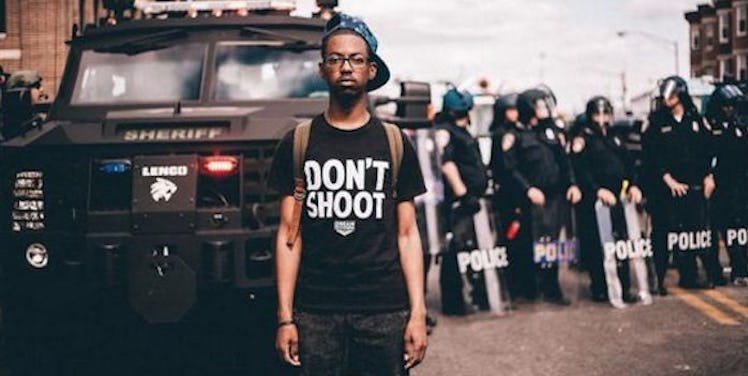Imagine you're a parent. Your teen daughter has been sulky lately. You eye each other with suspicion; you both feel disrespected.
You think she should be following your rules; she's tired of those rules.
Then, one day, she comes home and puts her fist through the wall and looks directly at you.
What would you do? Would you ask her what's wrong? Or, would you call her names?
The media has treated the upset teenagers of Baltimore with the latter approach. They've decided what these kids are without asking them.
The dialogue around Baltimore says "thugs" are destroying the city and more police are needed. This makes sense, as we've gotten the whole story from the parents.
Police officers have been all over the news; they've thoroughly informed us on the damage of the riots.
It's sad that a CVS got burned to the ground. Lots of people probably lost their jobs in a community that lacked jobs in the first place.
But, there's been more reporting on the burning buildings than the people in this city. Convenience stores are being treated like the Buddhas of Bamiyan.
These are places to buy Flaming Hot Cheetos and hemorrhoid cream; it's not a national tragedy when they burn down. They can be rebuilt.
Freddie Gray was a living human being who is dead now because of the police. And, he's part of a pattern we can no longer ignore. Harsh policing is the problem, not the solution.
The people out in the streets aren't thugs; they're teenagers.
"Thug" is the 21st century's N-word. It's a way to delegitimize without sounding overtly racist.
FINALLY SOMEONE SAID IT pic.twitter.com/XsjKe8qOiR — cammie ❃ (@caaammiiee) April 28, 2015
We don't know anything about these kids. So, it's irresponsible to even speculate they're thugs. We'd never say something like, "And now, some potentially abusive police officers are closing in on the scene."
It's an ugly bias that is distracting us.
The riots in Baltimore happened because of desperation. Eric Garner's daughter said,
"They had enough. They don’t know what else to do. They don’t have no jobs, they don’t have proper schooling. "I was driving through Baltimore earlier and I noticed how many abandoned buildings is out there. "It’s like there’s no hope. These kids have no hope. I’m not condoning what they are doing but like they think – they seem like they have no hope. "Eventually this is going to happen to me, I’m going to be killed by the cops, so why not go out there and get my message across? "Burning down the city is not right, but what other choice do we have? They scared."
And, she's not overstating the case. Van Jones brought our attention to a recent study by the Journal of Adolescent Health, showing that Baltimore teens are worse off than children in Nigeria.
Among teens, only 55 percent of males and 66 percent of females feel safe in Baltimore. That's worse than New Delhi, India and Ibadan, Nigeria.
And, Baltimore had the worst social cohesion out of the five cities studied, which also included Johannesburg, South Africa and Shanghai, China.
These teens don't feel like part of the population; they feel like targeted outsiders. And, it's hard to blame them. Among 16- to 25-year-old black people, unemployment is at 40 percent. Among black men, 1 in 3 is expected to go to prison for crimes committed by white men just as often.
But, instead of discussing the points made by Garner's daughter, CNN cut back to Don Lemon, who was interviewing two former Baltimore police officers. The conversation immediately shifted back to burning buildings.
The riots were bad. But, ignoring the living conditions for black youth is much worse. Punishing these kids is not going to do anything. We tried that -- it didn't work. It got the city burned to the ground.
This is such an obvious display of frustration that we need to start talking to young people — not just in Baltimore, but anywhere they don't feel safe. We need to hear their sides of the story to find out what needs to change.
Or, at the very least, we could stop calling them names behind their backs.
Disclaimer: The views and opinions expressed in this article are those of the author and do not reflect the official position of Elite Daily.
